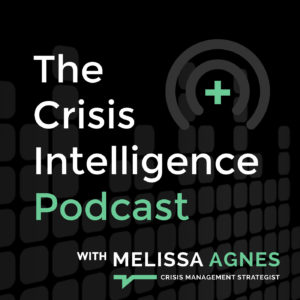Welcome to episode #025 of The Crisis Intelligence Podcast, with Melissa Agnes and Maanit Zemel
 Canada’s Anti-Spam Legislation (CASL) is a Federal legislative regime that came into force in Canada on July 1, 2014. This new anti-spam legislation applies to every person and organization communicating electronically to Canadians. This means that whether your organization is located in Canada or not, this legislation applies to you – and includes some pretty hefty consequences for non-compliance, so listen up!
Canada’s Anti-Spam Legislation (CASL) is a Federal legislative regime that came into force in Canada on July 1, 2014. This new anti-spam legislation applies to every person and organization communicating electronically to Canadians. This means that whether your organization is located in Canada or not, this legislation applies to you – and includes some pretty hefty consequences for non-compliance, so listen up!
Within this episode of The Crisis Intelligence Podcast, Maanit Zemel, a Canadian attorney specializing in CASL, and I discuss what CASL is, who it applies to and why it needs to be taken seriously. Remember that crisis prevention is the best form of crisis management and violating CASL (which is something that you may currently be doing without even realizing), is a risk that you absolutely want to mitigate. Tune into this week’s episode to find out why and how.
This episode of The Crisis Intelligence Podcast discusses:
- What Canada’s Anti-Spam Legislation is and why it applies to every individual and organization around the world.
- CASL’s exemptions.
- Consequences of violating CASL.
- How to create a CASL compliance policy, no matter what side of the border you’re on.
- How CASL is not just tough on spam, but tough on hackers as well.
- Actions your organization needs to take now, to make sure you are not and will not violate CASL.
It’s an informative listen. Enjoy!
Running time: 59:56
This podcast is also available on iTunes and Stitcher.
A brief introduction to CASL
CASL is one of the most stringent anti-spam regimes in the world (certainly more than the anti-spam laws in the US). For one, it does not regulate what we traditionally consider to be “spam”. Rather, it regulates all “commercial electronic messages” (“CEM”), which are very broadly defined in the legislation. Essentially, they cover any electronic messages (i.e., emails; texts; social media messages) that “encourage participation in commercial activity”. Commercial activity is also very broadly defined to include any form of activity that has a “commercial character”, including not-for-profit and charitable activities. In other words, CEMs may include most electronic messages sent in the course of business (including by not-for-profits and charities). It does not have to be a mass email. It can be one email to one individual.
Second, unlike the US, which has “opt-out” anti-spam laws, CASL is an “opt-in” regime. That means that it prohibits you from sending any CEMs without having FIRST obtained the consent of the person to whom the message is sent. In addition, CASL requires each CEM to include specific identifying information about the sender and an unsubscribe mechanism.
CASL imposes very serious consequences on those who (intentionally or unintentionally) violate it. An individual may be fined up to $1 million for each violation (e.g, each email) and an organization / corporation / business can be fined up to $10 million per violation. Fines can also be imposed personally on the directors and officers of a corporation that contravenes CASL. In addition, it gives the government substantial investigate and enforcement powers (including search and seizure orders). Additionally, in July 2017 there will be the option of civil actions.
For a business or organization, the most effective way to avoid liability is to develop and implement a CASL compliance policy. If the policy is effectively implemented, the likelihood of violating CASL is significantly reduced. Also, if a violation occurs, the business can rely on the “due diligence defence”, which allows the business to avoid liability.
Learn more about how to develop this CASL compliance policy and what this “due diligence defence” is, by listening to this episode of The Crisis Intelligence Podcast.
Get connected!
Have questions, comments or suggestions? Email melissa@melissaagnes.com
Subscribe and leave us a review on iTunes and/or Stitcher
Subscribe via email
Learn more about Melissa Agnes
Follow Melissa on Twitter: @melissa_agnes
Connect with Melissa on LinkedIn
Learn more about Agnes + Day, The Crisis Intelligence Firm.
Learn more about Maanit and her practice: www.casllaw.ca
Connect with Maanit on LinkedIn
Follow Maanit on Twitter: @maanitzemel
Email Maanit directly: mzemel@casllaw.ca
Learn more about Canada’s Anti-Spam Legislation at fightspam.gc.ca
Thanks to Maanit for taking the time to have this informative conversation with me!

Author of Crisis Ready: Building an Invincible Brand in an Uncertain World, Melissa Agnes is a leading authority on crisis preparedness, reputation management, and brand protection. Agnes is a coveted keynote speaker, commentator, and advisor to some of today’s leading organizations faced with the greatest risks. Learn more about Melissa and her work here.

Leave a Reply